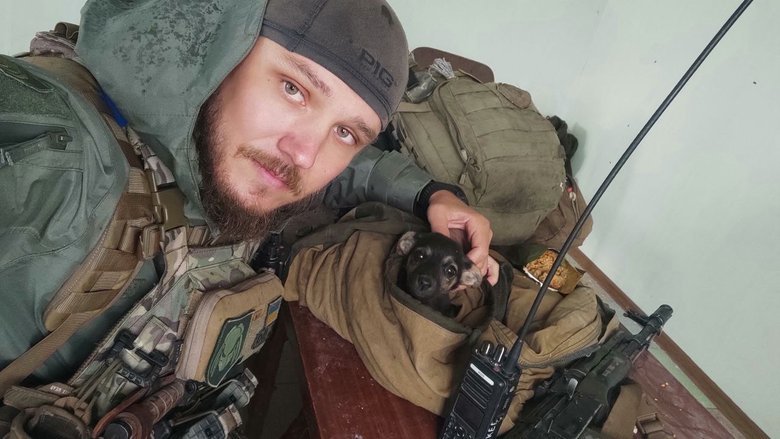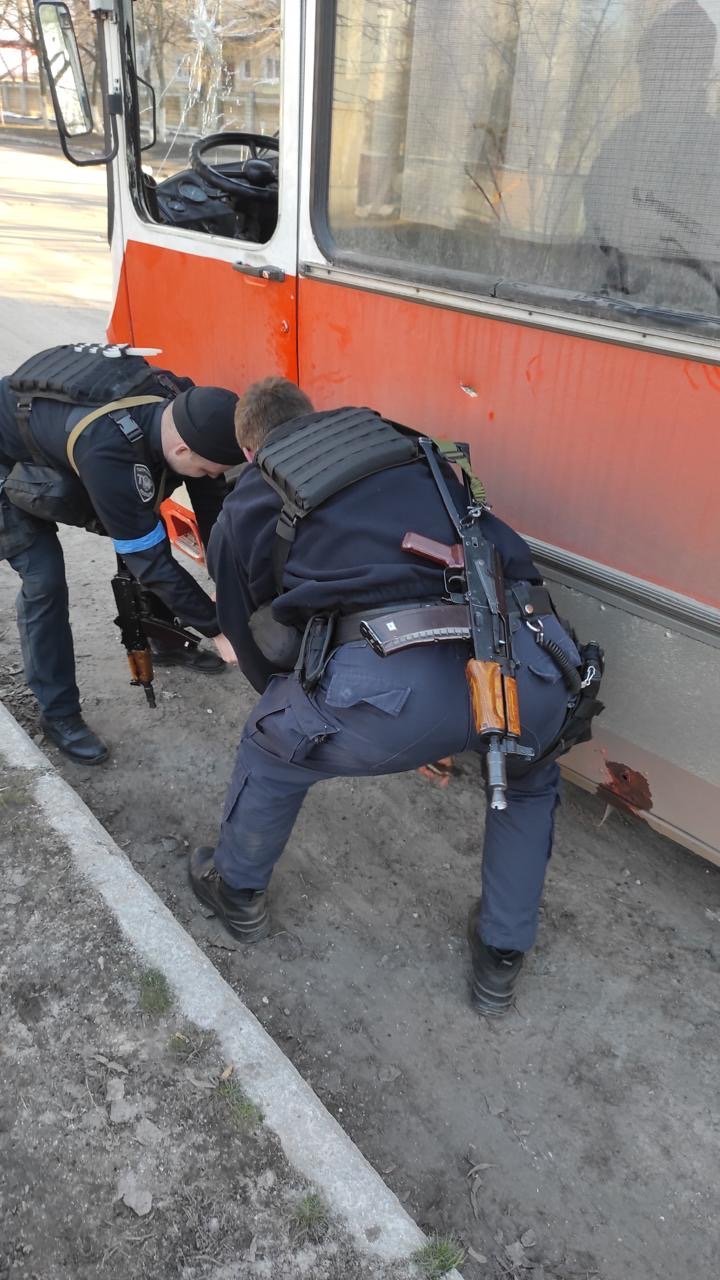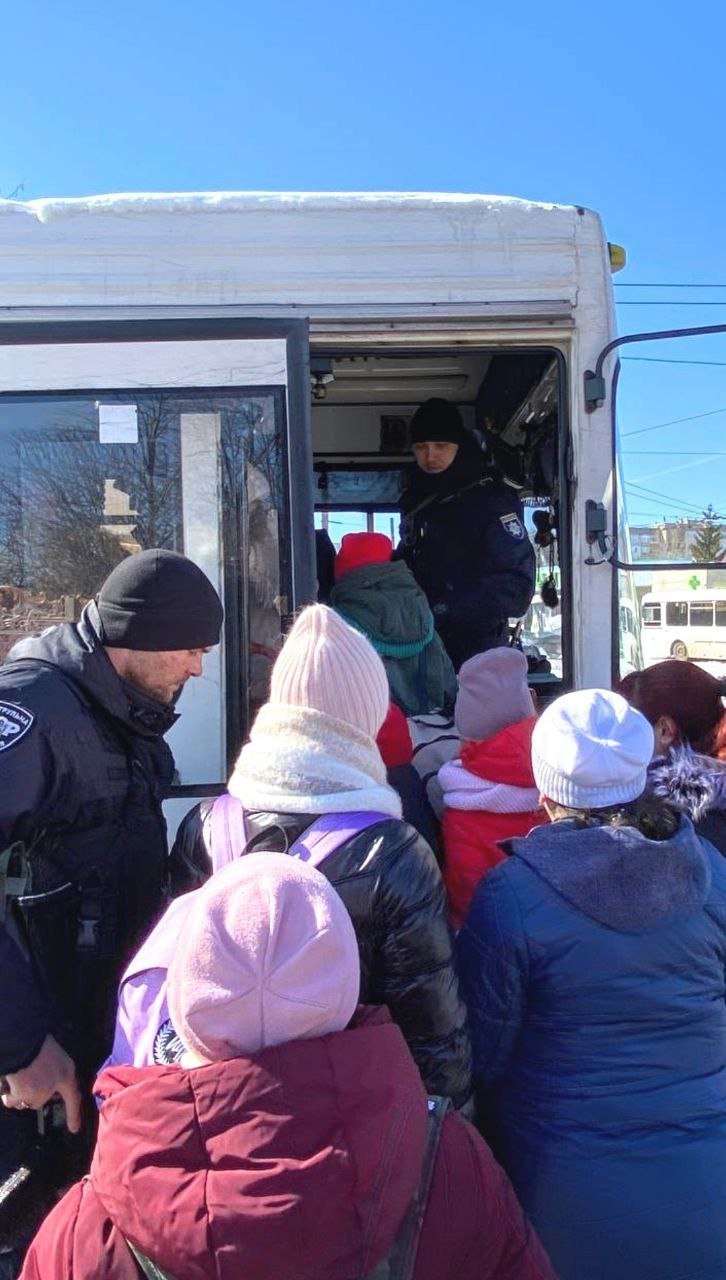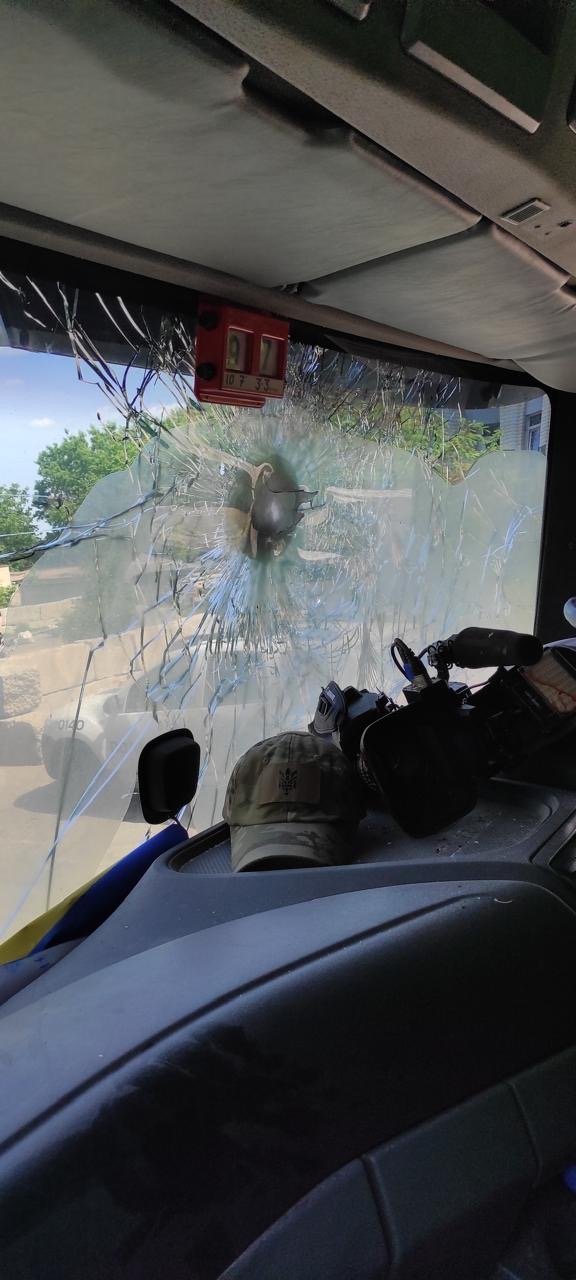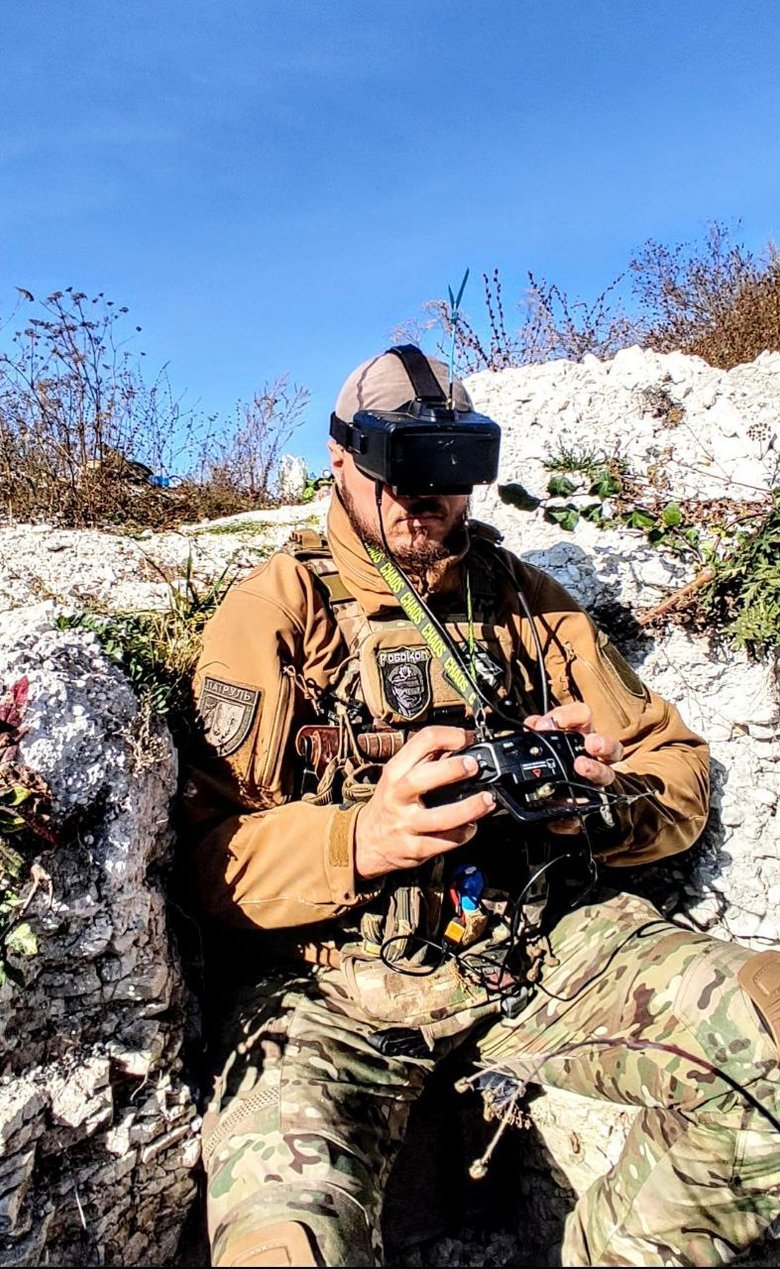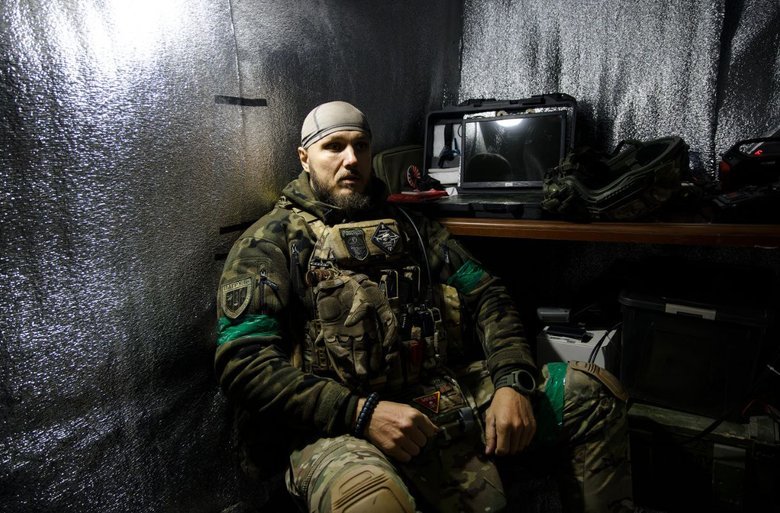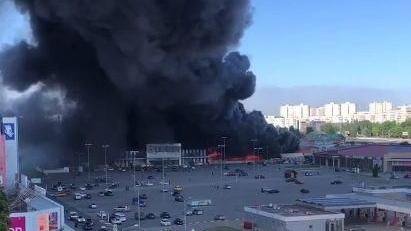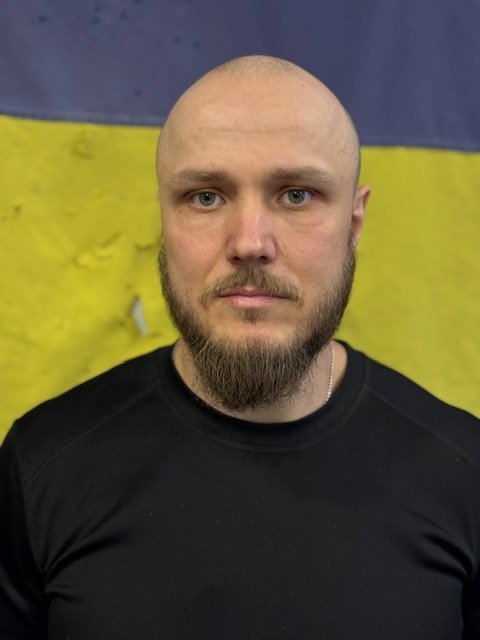Head of Kharkiv Region Patrol Police Viktor Levchenko: Explosions in Luhansk region began on February 24 immediately after Putin’s speech ended
For personally evacuating bedridden and ill civilians from Sievierodonetsk and Lysychansk under shelling from the semi-encircled cities, the patrol officer received the highest non-state award, the "People’s Hero of Ukraine." After receiving the award, the police lieutenant colonel repeatedly proved that he fully deserved this title, as he organized the combat unit "Robocops," which has been effectively taking out the occupiers.
When you hear about shelling in Kharkiv and the region, when civilians are suffering, you can be sure that this police officer is right there at the epicenter. He always insists on seeing with his own eyes what has happened, organizing assistance for people, and coordinating with other services. It was his idea to launch drones over strike sites to locate victims more quickly, an initiative that has helped save lives. This is not about trying to stand out or appear in journalists’ photos and videos. On the contrary, you will not find that, because he deliberately avoids being caught on camera. For him, the most important thing is to help, rescue, and protect. That is simply his character.
Professional athlete Viktor Levchenko joined the Patrol Police in 2015. At that time, he had no experience of combat, but the example of his legendary commander, Yevhenii Zhukov, call sign Marshal, who fought in Donetsk airport and other fierce battles, served as an inspiration during his training. Thus, after taking the position of head of the Patrol Police Directorate in Luhansk region, he continuously trained the personnel, which proved invaluable for the patrol officers in February 2022. We spoke in his office in Kharkiv about the Russian occupation of Luhansk region, the evacuation of local residents, the combat actions in which Viktor took part, and his wounds, against the backdrop of a flag that the patrol officers brought back from Lysychansk, from the building of the Patrol Police Directorate. "This is a reminder of the last days of Sievierodonetsk and Lysychansk," Viktor says.
"IN HENICHESK, FOR THE FIRST TWO MONTHS, MY FUTURE WIFE AND I LIVED IN A FORMER FISH PLANT: DAMPNESS, LICE, FLEAS, THE ROOF COLLAPSED..."
- You served as the chief patrol police officer of Luhansk region…
- Before that, I was head of the Crimea-Sevastopol Patrol Police Department. One evening, my commander, Yevhenii Zhukov, callsign Marshal, called me. He asked, "Do you want to take charge of a directorate?" I said, "Boss, affirmative. Just tell me which one." (he laughs.) He said: "Don’t rush—it’s Luhansk. Think it over. Tomorrow you’ll give me your answer." In fact, I didn’t need to think. I told my commander: "We work as a team. You know better who should be where, right?" The next day, I called him back: "When do I take up the post?" "Get ready"... I went through an interview with the Head of the National Police of Ukraine. After that, I assumed command. In 2019 I was appointed, held the position for three years until the full-scale invasion, and then another year after that.
- You are from Mykolaiv region. Luhansk is completely different, both the terrain and the population. And the war had been going on there since 2014. It was felt in that region more than anywhere else.
- A depressed region. And I felt very sorry for the people. The problem was not with the region itself, but with its leadership, so to speak. Since independence, no investments had ever been made in its development. People had few forms of entertainment. The main one was television—specifically Russian channels, which constantly repeated that "Putin is great"… Hostile propaganda was working this region very effectively. It was difficult to counter it.
I have always had my own firm stance. After my appointment, a deputy of the Rubizhne city council came to see me. We talked. He wanted us to release certain people and turn a blind eye to some things. I told him: "No." And he replied: "It’s because of people like you that the civil war in Ukraine began!" That set me off! I nearly grabbed him by the collar and threw him out: "Get out of here!" My patrol officers were calming me down: "Vasylych, come on…" And he threatened: "I’ll complain to the minister!" I took a breath, called my commander: "Boss, just so you know, there’s going to be a complaint against me, probably a scandal. I’m telling you as it is." The leadership supported me. And in the end, that deputy never filed a complaint. There were plenty of such people in Luhansk region.
- Where exactly were you based? In Sievierodonetsk?
- The Patrol Police headquarters was in Lysychansk, but we operated in Sievierodonetsk, Lysychansk, and Rubizhne.
From my experience, the living conditions were even tougher not in Luhansk region, but in Kherson region. When I was assigned to Henichesk-Kalanchak, finding housing there was extremely difficult. My girlfriend, later my wife, came with me. She has always been by my side. In the resort town of Henichesk, finding accommodation on a patrol officer’s salary of 16,000 hryvnias was very hard, since apartments were rented out daily for 500 hryvnias. We asked for a monthly rate, and they told us: "We can give you a small discount." But it still amounted to the entire salary. So for the first months, we lived in a shack, it used to be a fish plant, and the place was rented out by an old Romani woman. Dampness, stench, fleas, lice, and when it rained, the roof collapsed… That’s how my wife and I lived there.
- And after that she still agreed to marry you?
- Yes. She always understood my principles, who I am, and what I do. And she supported me in everything. In the Luhansk region it was difficult to rent an apartment, because many servicemen were renting housing and everything was taken. But we found one. And the fact that Luhansk region was a combat zone did not frighten me at all.
- Until 2022, it was relatively quiet here.
- Shelling was heard regularly. In Sievierodonetsk, when it got very quiet, you could clearly hear the artillery pounding. It was never truly quiet. On television, they claimed it was calm. But our soldiers were being killed even before the full-scale war.
- You went straight into the Patrol Police, you hadn’t served in the army before that…
- I hadn’t served in either the militia or the army. I am a professional athlete. A Master of Sport of Ukraine in shot put, until 2015 I competed for the national team of Ukraine. My entire life was in sports. There used to be a Central Sports Club of the Army, where athletes were nominally in military service but actually trained and competed for the army. I was listed there in the CSKA, so I was not drafted into the army. And when recruitment for the Patrol Police was announced in 2015, my friend joined in Kyiv and pushed me: "Come on, you should too!" In Mykolaiv, I passed all the selection stages, became a company commander. Later – deputy battalion commander, battalion commander, then head of a department…
At first, I thought: how can I make it into the police if I don’t have connections there? What kind of career growth could I expect? It seemed you had to have money and ties. But in the new structure, they focused on leaders…
- Did you feel or predict that the war would escalate?
- Let’s put it this way: in the Luhansk region, it was always tense. We were part of the Joint Forces Operation and went on missions right on the line of contact. It was tense, but it didn’t feel like there would be a full-scale war. About two weeks before the invasion, we began to experience very heavy shelling. In Stanytsia Luhanska, a kindergarten was shelled. And Shchastia was hit with Grads, there were already victims, wounded, and civilians killed. Residential neighborhoods were being hit. And they were claiming it was Ukrainians shelling themselves. The head of the military-civil administration decided that civilians should be evacuated, and we were supposed to participate. But about a week before February 24, everything seemed to freeze.
When all these strange movements began, my commander said: "Prepare the personnel. If possible, train with the National Guard soldiers, learn to shoot, throw grenades, learn military skills. Because war may be coming." We started fortifying the directorate, stacking sandbags around the building. People looked at us and tapped their temples, saying: "Stupid patrol cops, what are you doing?" But the patrol officers turned out not to be stupid at all…
"WHEN I HEARD AN ENEMY SNIPER FIRING AT US, I THOUGHT WE WOULD NEVER MAKE IT OUT OF THERE"
- How did you experience the beginning of the invasion?
- In the evening, we held a conference call. My deputy and I stayed overnight at the directorate. I couldn’t sleep, turned on YouTube, and a live broadcast of Putin’s speech popped up. Four in the morning, live stream, something was definitely wrong. Before his speech even ended, I already understood what it meant. I woke my deputy and said: "Sound the alarm, gather the personnel, we are at war." He said: "What war?!" I showed him: "Look, see this." He replied: "No way, maybe it’s something else." I told him: "Gather the people." I called the National Guard commander, and he said: "We already have movement." They were coordinating with the border guards. Stanytsia Luhanska, Bilovodsk, Milove near the border, intense shelling had already begun, Russian equipment was moving in combat formations. As soon as Putin finished speaking, explosions began for us. I realized it was both rockets and aviation striking. A building near the directorate was hit. The enemy was trying to target the bridges.
- How mentally prepared were you for this, you were an athlete, a police officer?
- I can’t say I was prepared for it. Nobody was prepared. Everyone believed it wouldn’t happen…
- ...that it was impossible in the twenty-first century.
- Yes, it seemed impossible… How could one country attack another in the center of Europe in our time? We thought there would be shelling, maybe some intimidation… But that they would strike so powerfully across the entire country… I can’t say I was mentally prepared, that I wasn’t afraid. Of course, I was afraid. I had never taken part in combat before. But when it all began… responsibility outweighed fear. You control it, you think: you must do this, this, and this, because you are responsible for your personnel. I had 300 men. Only by concentrating on that did I find clarity on what needed to be done. Yes, I had no combat experience, so I learned on the go.
- How did things unfold in the Luhansk region?
- I called my commander and said that it had started for us. He replied: "It’s started everywhere. Carry on…" We had to patrol the streets and maintain order. Everyone understood that traffic rules no longer mattered, family quarrels had ended. What mattered was the presence of the police, because it gave people a sense of security. In peaceful cities we might be called "selfie cops," but when it was terrifying, everyone clung to us: "Oh, patrol officers, you’re here, it’s good you’re with us, you’re protecting us," and so on.
- Were people leaving actively?
- Not right away. Many were waiting to see what would happen next. Those who had the means, who had transport, left. But not everyone had anywhere to go. Many had relatives in Russia. Even when we were already carrying out evacuations, people said: "We have nowhere to go." We explained that arrangements had been made for them, that everything was organized. If they needed clothing or food, it was provided. In western Ukraine, they were received and accommodated. If they wanted to go abroad, there was one procedure; if they wanted to stay here, there was another option. The main thing was to get them to a safe place where strikes wouldn’t hit their children and families.
At the beginning of March, the deputy governor called me and asked: "Do you have any transport or drivers available? An evacuation has been announced. We don’t have enough drivers; many are refusing to go." I asked my patrol officers: "Who can drive a PAZ bus?" The guys volunteered and evacuated many people.
That was the same PAZ bus. Later, a missile struck nearby and people were injured… But the vehicle was towed to the Patrol Police Directorate building and repaired.
The first evacuation was from the railway station in Lysychansk. With that PAZ bus we transported people directly to the station—we evacuated many, a great many, at that time. I still have a video, the station was completely packed, people crowding, boarding the trains…
- Did they run?
- I was constantly afraid something would hit there, when I saw those huge crowds of people.
On the second or third day, food problems began. Stores were completely emptied, and supplies were zero. What ATB truck would go into a region where every road was under fire? We had some rations, and we gave them to families with many children. Later, the administration organized a hub, and we suggested setting it up in our directorate. We cleared out the conference room and filled it with boxes. The female patrol officers who were with us packed the parcels. We had a phone operator to take calls. We even had a pharmacist who sorted out the medicines. We prepared packages, wrote down the addresses, and placed them in the lobby. A patrol car would arrive, load up with these parcels, and deliver them to the addresses. It was non-stop, from morning until night. We would head out as soon as it started getting light. One group handled evacuations, the other delivered humanitarian aid…
The number of people willing to evacuate kept increasing, and there wasn’t enough transport. Private carriers had disappeared at the very beginning. We were told there were buses at the oil refinery: "Take them."
We arrived, and the buses had no batteries, half dismantled. The patrol officers rolled up their sleeves, crawled under the buses, and started fixing whatever could be fixed… Click, one bus started up and drove off. Click-click-click and the second one was running. In the end, we managed to get three buses working. Later, the State Emergency Service helped us repair them, since they had at least some facilities. That’s how we worked. Later, when the battles for Sievierodonetsk were already underway and we were heading out to evacuate people, at the exit from Lysychansk, there stood a white bus, without wheels, dismantled, the very bus we had once used to evacuate people. That image stayed with me: standing by the roadside, wrecked and stripped, like a grim symbol of war…
- When did you start evacuating bedridden, isolated people? How did you learn about them?
- Their relatives from other regions would call us, saying: "My grandmother is bedridden, here is her address," and we would go. We used our Crafters that the special forces normally rode in. We evacuated many bedridden, elderly people from Sievierodonetsk and Lysychansk. If someone was in Hirske, we went to Hirske; if in Zolote, we went to Zolote. We evacuated from everywhere we got calls. Once, the head of the regional administration phoned and said that in Popasna, more than 70 people were sheltering in the locomotive depot. It was late March–early April. The situation was extremely difficult; the Russians were already breaking into the city. Some people said: "You can’t go there, it’s hell already…" I said I would go.
- How many volunteers agreed to go with you?
- There were four of us in total. I said I would go alone and that I couldn’t order anyone else to come with me. They replied: "We’re going!" We had two buses and a cover vehicle. On the way, we had to clear trees that had fallen onto the road during shelling… The city was completely destroyed. There’s video of it, but it doesn’t capture the full situation. Everything around was burning, exploding, gunfire everywhere. We ended up right in the combat zone. We were running, looking for people. Suddenly, a dirty, battered soldier with an assault rifle ran up to us: "Who are you?!" – "Police." – "What f***ing police, are you kidding? We’re in the middle of a tank battle. We’ve just taken out two tanks over that hill," he pointed. "What do you want here?" I told him we came to evacuate people. "Well yes," he said, "there are people." He sat down, lit a cigarette: "Will you take our wounded?" – "Of course we will." We went with stretchers. We stood there while he smoked. He said: "I’m acting company commander, but I’m just a regular soldier. The commander was killed, the deputy commander was killed, the sergeant was killed…"
Then he asked: "Got anything to eat, guys?" We gave him everything we had in the trunk, some canned meat, rations. He said: "We haven’t had a proper meal in two days. No supplies, nobody comes here."
We were standing there with that acting commander, smoking, when suddenly, clang against the railcar. He calmly said: "That’s a sniper, let’s move a bit behind the wall." At that moment, I thought: "Most likely we won’t get out of here alive." The only thing was to do everything possible. What is your task? To do whatever you can to evacuate the people. That was the mindset we worked with.
Luhansk region felt isolated. Other regions still had links with the rest of Ukraine, but we only got something occasionally. Our commander, Marshal, kept our spirits up, he wrote in the group chat, sent us videos. We held on thanks to that. But it was tough.
- Were you effectively encircled?
- In a semi-encirclement.
- Where did you take the people evacuated from Popasna?
- To the railway station in Sloviansk. Volunteers were already waiting for them there. The wounded were taken straight to the hospital. People were given whatever they needed, because they had nothing at all. They were fed, given warm clothes, and placed on a train.
When we were carrying those people, mortar rounds were landing nearby, explosions going off close around us. Right here was a fence, and just behind it, impact! And you realize: good thing it wasn’t you this time…
- What were you thinking along the way? Were you praying, clenching your fists, urging the driver to hurry?
- I caught myself thinking that I had to show confidence. Good or bad, the troops always look at the commander. If I showed that it was all over, that I didn’t know what to do, that I was scared, I would lose my personnel. That’s a fact. So I tried to project confidence, to show that I knew what I was doing.
We made two trips to Popasna. Both times I said: "I’m going, who’s with me?" I couldn’t order: you, you, and you are coming with me. No. It had to be each person’s own decision.
- But isn’t the commander supposed to lead the mission and stay alive?
- This wasn’t that kind of situation, let’s put it that way. Back then, we weren’t a combat unit, no one was prepared for this or trained for it. At that moment, I believed personal example was crucial, if the commander goes, it means everything is okay.
- All right, you went once to evacuate 70 people. Why did you go back a second time?
- Another 92 people were in a factory bunker. We were assigned a Kozak armored vehicle with soldiers to escort us, covering the buses, because there was still fighting, gunfire, mortar fire. We went down into that bunker, persuaded people to come out. We filled a bus to capacity, started driving away and then a mortar started working on us. The guys in the Kozak said: "They’re targeting us, let’s get out of here." We jumped in, an explosion to the side, then another. I saw the Kozak already racing ahead, while the bus was struggling to keep up. And then, boom! A fragment sliced through the door mount, and the doors, which opened pneumatically, fell off. I grabbed those doors and held them with my hands, we had to make it to Sloviansk on that bus. Then we cut off a seat belt, twisted it, tied the doors in place and that’s how we reached Sloviansk.
Those very doors, secured with a seat belt.
- You even saved the doors!
- I did (laughs). Back then it wasn’t warm yet, so we had to make sure it didn’t get too drafty.
"NEAR SIEVIERODONETSK WE CAME UNDER SHELLING, DURING WHICH THE DRIVER AND I WERE WOUNDED, AND A FRENCH JOURNALIST WAS KILLED"
- When did the understanding emerge that you needed to form a combat unit out of those ready to fight?
- It came from our commander, Yevhenii Zhukov. It was only logical to create such a unit from patrol officers. The chief had already formed the first such unit in Kyiv. By March, it was already fighting in Irpin. At that time, we still had other tasks: evacuations, humanitarian aid. And as long as that was necessary, we kept working, there was no thought of combat work yet… Once the bridge to Sievierodonetsk was destroyed, we went to Lysychansk on specific missions. We were given a British armored van, and with it we went to specific addresses, to shelters, delivering humanitarian aid and evacuating people, sometimes five, sometimes two or three. The mass evacuations were over by then. Some locals openly said: let’s get out already, so that "our boys" could come.
That’s where we came under shelling, during which I and another patrol officer were wounded, and a French journalist was killed. How did it happen? We were preparing to go to Lysychansk for an evacuation. The deputy governor called: "French journalists are on their way to you, they want to film the evacuation." They arrived and said: "We want to go with you." I suggested another option: "Let us go, we’ll bring people back here, and you can film them. I’ll shoot video in the city myself and send it to you from my phone. Because it’s real war there. It could be very dangerous." They conferred: "No, we have authorization, we’ll go." The driver got behind the wheel of a right-hand-drive vehicle, I sat on the left, and journalist Frédéric Leclerc with his camera was in the back, his seat was higher, like in a truck. He was a cheerful man, we chatted along the way. As we approached Lysychansk, he asked me something about the music that was playing. Then—boom! I told the driver: "We’re under fire, drive faster!" We made a turn and an explosion right in front of the vehicle, it lifted off the ground. I felt myself thrown, the vehicle was pierced, smoke and dust inside. I couldn’t see anything, my ears were ringing. I shouted to the patrol officer: "Drive faster!" And he said: "I can’t see anything!" I looked at him, his whole face was covered in blood. A fragment had gone through the windshield, pierced his helmet, and stuck in it, cutting his forehead.
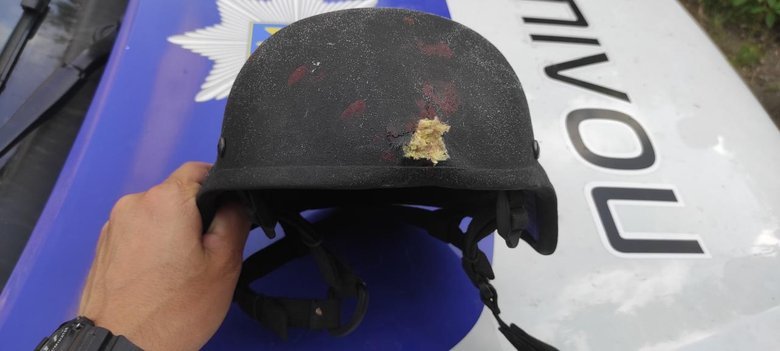
He was a real fighter, wiping the blood off and still steering, while the strikes continued. We made it to the district police department and spilled out of the vehicle. At that moment, I didn’t know the journalist had been killed. No one had looked back. People rushed out of the building: "What happened?" I said: "Give first aid to the patrol officer. And the journalist?" – "The journalist is KIA." – "What do you mean KIA?" I ran over and saw he was already convulsing. "But he’s still breathing!" They said no, it was over… A fragment had cut his throat. Frédéric had been sitting right behind me. The fragment went through the windshield, fatally wounded him, and pierced through the vehicle. Another fragment, which was meant for me, got stuck in the bend of the windshield, didn’t penetrate, and was still lodged there.
- How badly were you wounded?
- Concussed, and cut a bit by glass. Nothing serious.
- When did it happen?
- At the end of May.
- Did you need medical treatment?
- The first day I was running on adrenaline, but on the second I could barely stand, had no coordination, I’d put my foot down and it felt like there was no ground under it. I was evacuated to Dnipro first, then I called my commander: "Permission to go to Mykolaiv. At least I’ll get home, I haven’t been there for a long time." So I was treated in Mykolaiv. About two weeks later, I called my commander, I already knew the "Predators" were operating in the Kherson sector. He told me: "Stay in Dnipro. You’re the head of the patrol police directorate, focus on the personnel." I arrived in Dnipro, only to find all my subordinates had already been attached to the local unit. And there I was, a commander without personnel. Just sitting in an office, how could I? So I called the chief: "Permission to go to war, to join the ‘Predators.’" I remember he gave me a bit of a scolding, then said: "All right, fine." … That’s how I ended up at war, in the unit of Vasyl Koriak, a friend of mine.
- How did the "Robocops" group come about?
- "Robocops" was originally the name of a CrossFit sports team. I had created it before the full-scale war. Back then we represented the Patrol Police Department in sports competitions. The "Robocops" name was well known, because we won a lot of tournaments. When I joined Vasyl Koriak, he had a drone operators’ group called the "Dancers",after his call sign, and I trained with them.
Before that, I had only seen a Mavic once, when a friend let me fly it. I decided that to lead my unit and take responsibility for personnel in wartime, I needed to truly understand what war was. At that point, I knew what it was like to evacuate people under shelling, but I didn’t know how to conduct combat operations, how to choose positions, or how to set up logistics. I learned all of that from Vasyl, he had vast experience, having commanded a company in the 72nd Brigade in 2014–15, fighting in Donbas. He was a skilled commander, and I was fortunate to work alongside him. I learned a lot from him.
- And flying as well?
- Actually, it’s very simple. Back then there were no repeaters or electronic warfare systems. Now you have amplifiers, antennas… But at that time, you just took the Mavic out of the box, plugged in the controller, flashed it to enable an anonymizer. Because there’s such a thing, they can trace where the controller is and bomb that location. Our specialists figured out how to scramble that data. Flash it and that’s it, you’re flying. At first, it was just reconnaissance. We flew to adjust artillery fire, that was the most basic task. On the Kropyva map, we’d mark the coordinates where the shell landed, pass them to the artillerymen, and they would adjust accordingly. Now you just turn it on and there’s a live drone feed, and they see in real time where they’re hitting. Back then it was harder, but also more interesting.
Around mid-June I was sent to the Kherson region and stayed there with the "Predators" until the end of August. When the Kharkiv counteroffensive began, half of the unit was redeployed here. Together with the 25th Brigade and their reconnaissance units, we liberated Izium, Ridkodub, and Lyman.
- Did you advance together with the paratroopers?
- We were right behind the assault troops. Reconnaissance capabilities are a bit different now, but back then they were much more primitive. The Mavic could only fly two or three kilometers, but you had to get it there, hover, observe, so you had to be as far forward as possible. Back then, as I like to say, those were the romantic times, we were advancing constantly, recapturing something every day. Every night we slept in a new place. We ate whenever we could. We were always on the move. One day we captured a IFV, another day we seized something else. Always on adrenaline, moving actively forward.
- That must have been very motivating.
- Absolutely! At that time I had a dream: that we would push into Kreminna, maybe even retake Sievierodonetsk and Rubizhne. That was my mindset, to reclaim the land entrusted to me. But… We captured Lyman, reached Nevske and Makiivka, fought for Svatove, Chervonopopivka, that whole area and then the forces were exhausted. The Russians also brought in reserves and dug in. So everything came to a halt.
Since then, the nature of the war has completely changed. Earlier, the scariest battles were tank battles. A tank would roll out, fire, another would take its place and fire again. You’d deploy a Stugna, and close combat would follow. But now, if a tank appears even ten kilometers away, a swarm of drones will fly in to burn it, and it has no chance of reaching a firing position. No matter how well protected it is, it will still be destroyed.
Around October 2022, the governor of Luhansk region reached out to me, we had recaptured Makiivka and Nevske, those were our areas: "Would you like to help with evacuating civilians, to continue this work?" I called the chief, and he said: "Gather your guys, your group, and set it all up." So we once again helped with evacuations in the liberated areas of Luhansk and Donetsk regions. But by then I already had combat experience. Between missions I trained my subordinates at the permanent deployment site, showed them how Kropyva worked, taught them to fly drones, throw practice grenades, and adjust fire. I was preparing them, because I knew sooner or later we’d be back on the front line. And after a month or two, once we had evacuated people from those villages, I reached out to my commander again.
At that time, FPV drones were beginning to be used. We started digging into the subject. Through volunteers we got three FPVs, bought controllers and goggles. We studied how they worked, started flying, dropping payloads, maneuvering into tight spots and we began to succeed. FPVs weren’t very developed back then; there were maybe two or three groups showing what they could do. Then the commander of the "Predators" suggested: "Listen, the ‘Liut’ unit is storming Kurdiumivka and Klishchiivka now. Support them."
Our first mission: we launched and immediately lost a drone. It was such a downer, losing a drone right away… There was a damaged IFV that needed to be finished off. What could we do? We launched again. With the second drone, we struck directly, with video confirmation from a Mavic, everything as it should be. That’s how our work began. By then, there were already Madyar’s Birds and other groups, and I suggested: "Let’s call ourselves the ‘Robocops.’" And that stuck. We worked very productively not only with "Fury" but also with other units in that sector…
- What do you mean by "productively"?
- We destroyed high-value targets: IFVs, KamAZ trucks carrying troops, mortars. Took out quite a bit of enemy infantry. Now it might sound like nothing special, just regular targets. But at that time, when an FPV reached the target, hit it, and killed, it was a big deal. Especially since we were self-taught, learning from the Internet. The groups we reached out to, the ones who already had some expertise, weren’t very willing to share their knowledge. For some reason… My position is: whatever we know, we pass on to others. People come and say: "Teach us." Of course, here’s what we know. Because those people will be doing the same job, we are killing the enemy. And if I don’t teach you, you’ll waste time, you won’t be effective. Our task is to kill as many of the enemy’s manpower as possible and everyone must be able to do it.
- There’s plenty of enemy to go around…
- I don’t understand what there is to withhold. This isn’t some secret for success in a sports competition—this is war, and our survival depends on it. We haven’t won yet, and we still have a long fight ahead…
"UKRAINIAN PATROL POLICE – THE ONLY ONE IN THE WORLD THAT FIGHTS"
- When were you offered to head the Kharkiv region?
- That was sometime in the summer of 2023. I was already working with my own group within the "Predators", the "Robocops." At that time, active fighting was underway in what was called the "Forest of Wonders", that’s what people called the Serebrianskyi forestry.
We were working, fighting together with Azov. We really synced well with them. Everything was moving, functioning. Then my commander called and said: "You need to head the directorate." And I believe this: if the commander says it’s needed, it means there’s a task and they’re counting on you. And if I say "no"… I judge by myself. I’m a commander too, only at a lower level: if someone tells me "no," I have to keep looking for someone else, because the task hasn’t gone away, and time is lost. So I answered: "If you think it’s necessary… At least tell me where?" – "Kharkiv." And that’s a city of a million people. War itself is simple: the enemy in front, a comrade beside you. Shoot, destroy, survive. But here it’s a different politics, a different scale, a different responsibility. Plus, war and civilians… This is work that requires more than just "shoot and be proud of yourself." But if they decided to appoint me specifically to this post, then I had to take it on. Commanders see the bigger picture, more than I do. The only thing I asked was: "Chief, allow me to open a UAV operators’ school and train people."
- Did you bring your drone team with you as well?
- I lined everyone up at the permanent deployment base. I said: "Guys, here’s the situation. The commander’s order is that I’m appointed to Kharkiv region. Whoever wants to come with me, let’s go." Right away one fighter joined me as deputy, and three others also agreed. The rest stayed behind, since the unit was still needed there. For about six months, I regularly traveled back to them.
- Good thing it’s not far.
- It’s just a two-hour drive.
- And the FPV school?
- Everything got rolling immediately. We trained Kharkiv patrol officers, though at first without combat missions.
- Did many Kharkiv patrol officers want to fight?
- Yes, quite a few did. Two of those we trained here went on to join my "Robocops," and they’re still fighting honorably with the "Predators."
The offensive on Kharkiv region hadn’t started yet, but the war was strongly felt: shelling, drones. With Yevhenii Zhukov’s permission, I reached out to the commander of our sector, Yurii Halushkin, who had just been appointed. He knew patrol officers were fighting. Right away, he said: "Yes, you’re needed. I’ll decide where to send you." And we were attached to the 125th Brigade, worked with them, launched "Darts" for the first time, large fixed-wing drones. And our first successful strikes happened then as well. We worked effectively. Everyone was satisfied.
At first, the "Robocops" group was small, just seven men. When the offensive on Kharkiv began, we were also on the frontlines. Chaos broke out. Those who were relied upon couldn’t hold, so we too had to pull back from our positions, almost from encirclement.
- Did you retreat from the positions you had been flying from?
- Yes. The frontline shifted very quickly. Positions that in the morning had been deep in the rear and from which we flew, by midday had turned into a combat zone, and by evening were controlled by the enemy. By that night, Russians were already filming videos from our former positions. They were only stopped once the reserves of the 92nd Brigade were brought in. Our group pulled out in a pickup truck, and we were almost fired upon by one of our own tanks. The pickup had no clear recognition marking and what’s a tanker supposed to do? He was told: stabilize the front… We got through, but the impression stayed with us for a long time.
We fell back, gathered our thoughts. By then we knew the 125th was being pulled out, and other brigades would take over. The question arose: who do we work with? Khartia? I was connected with a fighter with the call sign "Altair" at the time he was chief of staff. I called him, introduced myself, explained: "We’re from the Patrol Police, drone operators, worked with the 125th, we can reinforce you." At our very first meeting I said: "We’re not after ranks or stars. We don’t need to measure ourselves against anyone we just want to work and take part in destroying the enemy." That remains the foundation of our cooperation to this day. We constantly show our work so people see and understand that the police are also fighting.
- Come on! People always say: let the police go fight! And when you tell them the police are fighting, they don’t believe it!
- How many police officers have been killed or wounded? The Ukrainian Patrol Police is the only one in the world that fights. When people are scared, they cling to the police: "You’re our boys!" But when things are calm, it’s easy to mock or belittle us. We’re used to it. But it’s unpleasant, because it’s not true. You want to prove something, but you realize there’s no way to prove it. So you just live with it. You just do your job, that’s all.
- How big is the "Robocops" group now?
- I won’t name the exact number, but we’ve grown to the point where our people fly both fixed-wing drones and heavy drones, the ones the enemy calls "Baba Yaga." We drop heavy bombs on Russian positions, deliver everything our infantry needs: drones, food, fuel, ammunition. We have standard FPV drones, fiber-optic systems, and many innovative tools that are used effectively. And all of this is the work of patrol officers!
- Did the group grow thanks to patrol officers who saw your results and said, "We want that too"?
- Yes, it was Kharkiv patrol officers. We spread the word that there was an opportunity to learn. I connected with the deputy chief of the National Guard in charge of training here in Kharkiv, and our patrol officers began going through military training: learning to fire RPGs, machine guns, and tactical medicine. At the same time, they trained in drone operations. We trained whoever wanted it. Our knowledge and skills also proved useful after strikes on the city. For example, we arrived at an oil depot after a Russian strike, fuel was spilling, everything was on fire. The State Emergency Service was trying to find a way in. I said: "Just send a drone up, see what’s where." – "We don’t have one!"
- And you started flying drones over the city?
- Yes. With my commander’s permission, I organized aerial support based out of the directorate. Everything was coordinated with all the relevant services.
- Does it save lives?
- Of course! After major strikes at night, we used a drone with a thermal camera to look for survivors. And we found them!
When KABs hit the Epicenter mall, we flew too, and the SES teams used the footage to assess the damage, track the spread of fire, and identify entry points. Even the president posted a screenshot from our drone over Epicenter. Now, the National Police headquarters, the SES, and the city’s emergency department all have their own aerial support. But it all started with the Patrol Police—our initiative. It was needed, so we made it happen.
- Kharkiv is being shelled more and more brutally…
- The city greeted me with two Shaheds… I had just arrived, introduced myself, and that very night two Shaheds struck a car repair shop in a residential district. I rushed to the site, started working, there were victims. That’s when I realized we needed to create an armored group with specialists in first aid, to provide immediate help to the wounded at strike sites. Marshal provided two vehicles for these groups. Patrol officers underwent tactical medicine training. We assembled powerful medical kits, quality tourniquets—volunteers helped a lot, and I’m deeply grateful to them, because they saved many lives. Strike, glide bomb, rubble, the patrol officers are the first there, digging, pulling people out, bandaging, stabilizing, and handing them over to medics.
You ask what stands out the most… After the strike on Epicenter, a couple more strikes hit nearby. There was an access road and a patch of forest. A fire broke out. SES was putting out that forest fire. And the Russians dropped two KABs on the firefighters. We rushed there. There was a shelter in the basement of a gas station, we carried the rescuers inside. One had an injured arm, another had chest wounds. Patrol officers applied a tourniquet to the first, an occlusive dressing to the second… Later medics asked: "Who gave first aid? Thank these people, because they saved the guys’ lives." That was a powerful moment! Because SES are our brothers-in-arms, we’re always side by side. And here the patrol officers saved the lives of rescuers. That’s very important to me.
- Have you ever regretted joining the Patrol Police? Or does your wife ever say: "Why did you choose such a profession?" Every call, every explosion, you’re rushing there… You’re always in the epicenter of events…
- I’ve been very lucky with my wife (laughs). She understands and supports me. These days, every patrol officer on the ground knows exactly what to do, but the presence of a commander still matters.
- And you’re not just standing aside…
- Right. If I arrive earlier, alongside the patrol officers, I join in too. I always carry a medkit and gloves with me, and I help as well. That’s normal, that’s how it should be.
Both my wife and I are athletes. She was a hurdler, I was a shot putter. We started dating before I became a police officer. Whenever I had to move to a new duty station, she came with me. I’d suggest, "Stay behind until I get settled," but she always said, "No, I’m coming with you!" So we moved together—to Henichesk, then to Luhansk region, and now to Kharkiv. Last August, our daughter was born here. But at that moment, I had to take the Robocops on a combat mission to Sumy region… My wife understood: it was a combat task, and I had to carry it out. So it was my deputy who picked up my baby from the maternity hospital (he smiles).
- Even then she didn’t ask: "Who’s more important to you—me or the job?"
- No, thankfully. She’s never asked that. Right now, what matters most to me is doing everything I can so that my daughter never knows what war is. I want my child to be proud of me, not to grow up thinking her father just sat out the war somewhere. That’s all.
- Tell me, what do you dream about? You must have some dream?
- I think everyone’s dreams have changed, and now they’re very similar. My dream is for all the Russians to die, for them to truly disappear from this planet. Because there will be no peace for us as long as the empire exists. Yes, it’s a pseudo-empire. Yes, as always, it limps along on one leg, but it’s still an empire that survives only by subjugating, absorbing, and destroying. As long as it exists, we will always have to fight for our independence. It’s a medieval empire; they fight like in the Middle Ages, they live the same way, and their mindset hasn’t changed either. Savages and barbarians but there are so many of them. And as long as they exist, there will be no life not only for us, but also for Georgia and Moldova. Moldova only still exists because Ukraine stands in front of it, and Moldovans understand that themselves.
By the way, my wife and I used to speak Russian with each other. In my family, with my parents, we always spoke Ukrainian, my family is Ukrainian-speaking, my mother is from western Ukraine. But with my wife, we spoke Russian. When the full-scale war had already started, I was with the "Khyzhak" unit, we hadn’t seen each other for months, I came home and said: "Listen, you know Ukrainian, I know Ukrainian. Why are we speaking Russian?" The first couple of days felt unusual. Now, when we watch old videos of ourselves speaking Russian, we wonder how we could have ever spoken that way! Now it grates on the ear. People say language doesn’t matter. No, it matters a lot! For me, speaking Russian isn’t a problem, but my native language is Ukrainian. And as long as your culture exists, as long as you raise your children with national values and respect for your homeland, then you are Ukrainian, you have your own culture, your own country and it will endure. If we don’t do this, then in one or two generations it will all disappear… So much effort went into erasing it: Russian music, rap, TV, movies, soap operas, "Goluboy Ogonyok," (Little Blue Light - ed.note) the "what difference does it make" narrative… All of it was done deliberately. So my dream is this: for my children to be proud of their parents, to grow up and study in Ukraine, in a peaceful and free Ukraine. For that, Russia must cease to exist, and Ukraine must endure. And that’s how it will be, there is no other way.
Violetta Kirtoka, Censor. NET

